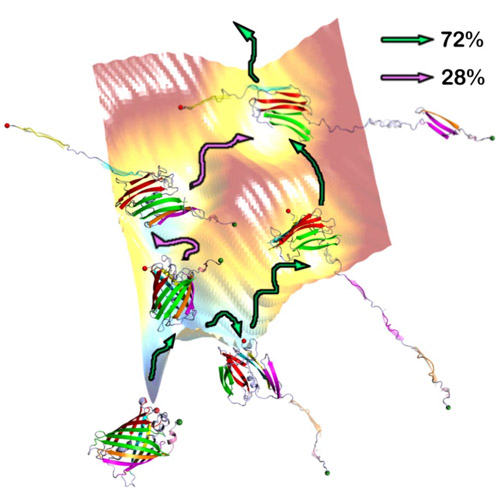Revealing the bifurcation in the unfolding pathways of GFP by using single-molecule experiments and simulations
18-Dec-2007
PNAS, 2007, doi: 10.1073/pnas.0705458104, vol. 104 no. 51 20268-20273, published on 18.12.2007
PNAS, online article
PNAS, online article
Nanomanipulation of biomolecules by using single-molecule methods and computer simulations has made it possible to visualize the energy landscape of biomolecules and the structures that are sampled during the folding process. We use simulations and single-molecule force spectroscopy to map the complex energy landscape of GFP that is used as a marker in cell biology and biotechnology. By engineering internal disulfide bonds at selected positions in the GFP structure, mechanical unfolding routes are precisely controlled, thus allowing us to infer features of the energy landscape of the wild-type GFP. To elucidate the structures of the unfolding pathways and reveal the multiple unfolding routes, the experimental results are complemented with simulations of a self-organized polymer (SOP) model of GFP. The SOP representation of proteins, which is a coarse-grained description of biomolecules, allows us to perform forced-induced simulations at loading rates and time scales that closely match those used in atomic force microscopy experiments. By using the combined approach, we show that forced unfolding of GFP involves a bifurcation in the pathways to the stretched state. After detachment of an N-terminal alpha-helix, unfolding proceeds along two distinct pathways. In the dominant pathway, unfolding starts from the detachment of the primary N-terminal beta-strand, while in the minor pathway rupture of the last, C-terminal beta-strand initiates the unfolding process. The combined approach has allowed us to map the features of the complex energy landscape of GFP including a characterization of the structures, albeit at a coarse-grained level, of the three metastable intermediates.











